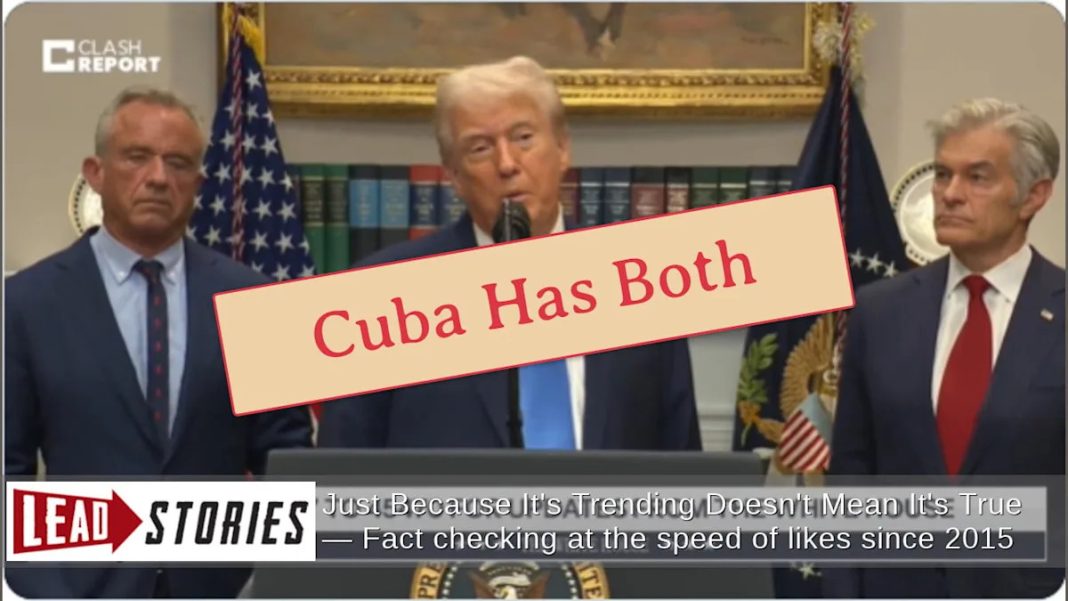Is it true that Cuba has no access to Tylenol and virtually no autism? No, that’s not true: This rumor is false on both counts; Tylenol, usually marketed in Cuba as Paracetamol, is available — although there can be shortages. The rate of diagnosed autism in Cuba is lower than world averages. There are nine schools for autistic children in Cuba and reporting from the state-run Cuban News Agency said there are about 3,500 people in Cuba diagnosed on the autism spectrum out of a population of 10 million.
A video clip from a White House announcement was posted on X (archived here) by @front_ukrainian on Sept. 22, 2025. The post was captioned:
❗️Donald Trump: There’s no Tylenol in Cuba because they can’t afford it. And they have virtually no autism.
BioCubaFarma supplies 395 medications to the National Health System (NHS). Of these, 255 were out of stock at the end of January. The main causes of the shortages were the unavailability of raw materials, finished products, and supplies.
In this report, both the Paracetamol 500 MG tablets and Paracetamol 120MG/5ML oral liquid were listed as unavailable because of “unavailability of raw materials, finished product and materials”. The supply of Paracetamol goes up and down, and this is reflected in news reporting on the topic. At the start of the COVID-19 pandemic on April 21, 2020, The state Cuban News Agency reported:
Luis Armando Alarcon Camejo, MedSol’s general director, explained in an exclusive interview to Cuban News Agency that once the Ministry of Public Health (MINSAP by its Spanish acronym) gave the indications about which medicines would be needed, the productive response was quick and effective.
A production campaign was carried out that made it possible to obtain the necessary amounts of Azitromycin, Paracetamol, Oseltamivir, Chloroquine and Dipirone, in which the three Enterprise Base Units of the institution were involved: Novatec, SolMed and Reynaldo Gutierrez, he said.
Autism
A June 12, 2025 article titled “Autism in Cuba” published in autismspectrumnews.org cited the number of autism schools in Cuba as well as the need for medications:
Finally, there are 9 autism schools in Cuba, 4 of which are in, or close to Havana. Children are assigned to these schools through their municipalities.
And they all report that the greatest source of pain and suffering due to the embargo in these schools, is the vast unavailability of medications (especially those prescribed for ADHD and epilepsy).
It is unclear if the nine schools mentioned above included the most recent school to open. An Aug. 21, 2025 article by the Cuban News Agency reported on the school scheduled to open on Sept. 1, 2025. It will have 25 students total, 19 with autism. The final paragraph of the article reads:
Cuba, with approximately 3,500 people registered on the autism spectrum – 60 % of whom are male – is advancing a community model that seeks to break down barriers and build support networks based on love and science, according to Dr. Osmara Delgado Sánchez, a disability program specialist at the Ministry of Public Health.
A report in the April-July 2017 International Journal of Cuban Health & Medicine cautiously estimated, that 1 in 2500 Cuban Children have autism compared to 1 in 160 children worldwide:
Based on these data and records from people receiving autism services and referrals, the Ministry of Public Health estimates that 1 in 2500 Cuban children suffer from ASD–but recognize that this is likely an underestimate due to flawed and incomplete surveillance and data collection methods.
Population statistics websites such as worldpopulationreview.com estimate Cuba’s population is about 11 million.

